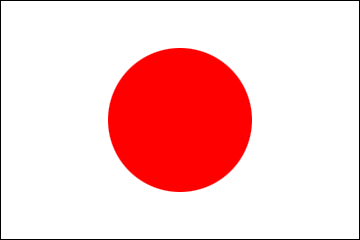Ambassador ITO Naoki Visited Cox’s Bazar
2022/9/13
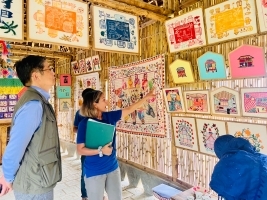
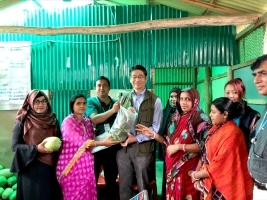
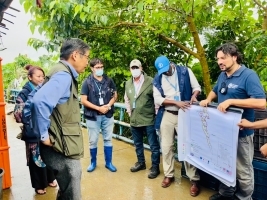
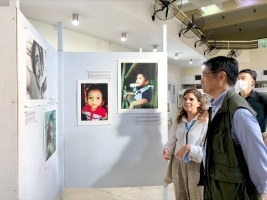
Dhaka, September 13th, 2022-
The Ambassador of Japan to Bangladesh paid a visit to Cox's Bazar. The two-day visit was conducted just after the 5th year of the Rohingya influx and Japan's new contribution to UNHCR and WFP, USD 8.2million in total.
The mission visited the learning center and multi-purpose center of UNICEF, the Rohingya Cultural and Memory Centre of IOM, and an aggregation center of WFP. In addition, innovative reforestation sites by FAO-WFP leveraging insights of green pilot projects under the Japanese government funding at camp 11, and Ukhiya Specialized Hospital of UNHCR, recently opened under Japan's contribution, were explored.
Through our mission, positive change was seen based on the endorsement of the skills development framework at the recent National Task Force.
Having an in-person meeting with RRRC, Mr. Shah Rezwan Hayat, Ambassador ITO, highlighted providing skills development and livelihood opportunities for Rohingya refugees is crucial, particularly ensuring sustainability in Bahasan Char.
He also had an in-person meeting with Md. Mamunur Rashid, Deputy Commissioner of Cox's Bazar, referring to the importance of connectivity between MIDI and the refugee camp.
At the end of their stay in Cox's Bazar, he went to the photo exhibition of Rohingya refugees held at Cox's Bazar Cultural Centre. Looking at pictures taken by Rohingya youth photographers, he said, "These artistic pieces really show the talents of refugees. It would be wonderful to bring such inspiring artists' event to Japan through UNHCR."
Since the outbreak of violence in Rakhine, Myanmar, in 2017, Japan has supported the Rohingya refugees, the Government, and the people of Bangladesh, by providing more than USD 170million in funding through international organizations and NGOs. Japan will further cooperate with the relevant agencies for better living conditions for Rohingya and host communities both in Cox's Bazar and Bhasan Char while making an effort for early repatriation to Myanmar. Finding lasting solutions to this crisis will be conducive to our pursuit of a "Free and Open Indo-Pacific."
The Ambassador of Japan to Bangladesh paid a visit to Cox's Bazar. The two-day visit was conducted just after the 5th year of the Rohingya influx and Japan's new contribution to UNHCR and WFP, USD 8.2million in total.
The mission visited the learning center and multi-purpose center of UNICEF, the Rohingya Cultural and Memory Centre of IOM, and an aggregation center of WFP. In addition, innovative reforestation sites by FAO-WFP leveraging insights of green pilot projects under the Japanese government funding at camp 11, and Ukhiya Specialized Hospital of UNHCR, recently opened under Japan's contribution, were explored.
Through our mission, positive change was seen based on the endorsement of the skills development framework at the recent National Task Force.
Having an in-person meeting with RRRC, Mr. Shah Rezwan Hayat, Ambassador ITO, highlighted providing skills development and livelihood opportunities for Rohingya refugees is crucial, particularly ensuring sustainability in Bahasan Char.
He also had an in-person meeting with Md. Mamunur Rashid, Deputy Commissioner of Cox's Bazar, referring to the importance of connectivity between MIDI and the refugee camp.
At the end of their stay in Cox's Bazar, he went to the photo exhibition of Rohingya refugees held at Cox's Bazar Cultural Centre. Looking at pictures taken by Rohingya youth photographers, he said, "These artistic pieces really show the talents of refugees. It would be wonderful to bring such inspiring artists' event to Japan through UNHCR."
Since the outbreak of violence in Rakhine, Myanmar, in 2017, Japan has supported the Rohingya refugees, the Government, and the people of Bangladesh, by providing more than USD 170million in funding through international organizations and NGOs. Japan will further cooperate with the relevant agencies for better living conditions for Rohingya and host communities both in Cox's Bazar and Bhasan Char while making an effort for early repatriation to Myanmar. Finding lasting solutions to this crisis will be conducive to our pursuit of a "Free and Open Indo-Pacific."
